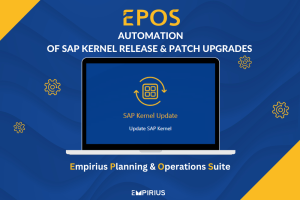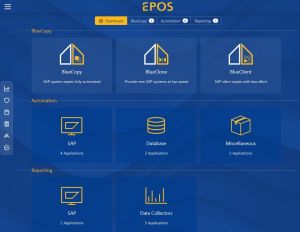
Upcoming EPOS Release: What's New
We're in the thick of developing our next release and we're excited to share the planned enhancements with you.
Read more

It’s time for the next kernel upgrade and long nights and weekend shifts lie ahead. But what if we were to tell you it doesn’t have to be this way?

The administration of SAP systems is a complex and time-consuming task.
It includes diagnosing system problems, performing backups, restoring databases, and also the tedious task of patching.
You’ve probably encountered the problem before: the new kernel updates are due, and long nights and weekend shifts lie ahead.
The kernel is the centerpiece of an SAP system. It contains executable files that contain information about various SAP processes, such as information about starting up and shutting down the database, starting up SAP itself, running applications, unpacking SAP files, managing user processes, memory management, and so on. Some programs contained in the executable files are potential points of attack for exploiting security vulnerabilities, such as SAP's built-in web server or SAP Gateway.
And just as the operating systems of cell phones and computers need an update or a patch every now and then, an SAP system also needs regular kernel updates. These updates contain revised versions of the executable files with various instructions for system execution. Some updates contain extensions, some improvements and some fix bugs from previous versions, which pro-actively help to minimize problems and troubleshooting. It is therefore considered good practice to patch the SAP kernel more than just 1-2 times a year.
On its own, kernel updates are simple to perform.
But there is a catch:
One of the problems of updating the kernel, is that the updates cannot be performed during normal working hours since the SAP system needs to be shut down completely before the process can be started. No one can work on the system during this time. Apart from it taking some time to be executed, the process also requires staff to be on duty in the evenings or on weekends – during the typical downtimes of the system - to monitor the whole process.
And if something doesn't go as planned... then stress and extra work are going to be inevitable: The update has to be reverted and another downtime for a restart is necessary.
A series of steps are required until the kernel update is finally completed, especially if the kernel update is being done manually, and the more SAP systems that have to be patched to a new version, the more time it requires and more errors can occur.
Sounds like a lot of work – and indeed it is.
We can't take the day-to-day business off your hands, but we can take care of maintaining your SAP systems.
Luckily, kernel updates can now be automated - you specify in advance when you want the updates to take place, specify the necessary parameters, and we take care of the rest.
With EPOS, you can schedule kernel updates ahead of time and have them be performed when no one else is working on the systems. The best part: there is no need for staff to be working at night or on weekends.
You determine on which systems the kernels are to be replaced or patched, specify the path to the SAPCAR directory and for the patch repository. EPOS checks which kernel version is currently installed, checks whether new patches are available in the repository and recommends patches that are available for the installed kernel. All you have to do now is enter the execution date, start the job, and EPOS will take care of the rest. Take a look at this detailed guide to the individual steps.
And if something should go wrong and an SAP system not be able to be started after the update, the fallback solution intervenes and the old kernel is automatically reinstalls the previous kernel version.
To check the success of the job you can either log into EPOS and open the tab named "summarylog" or you can alternatively choose to be notified by e-mail about the status.
Kernel updates are the be-all and end-all of well-running SAP systems. The updating process, however, can take a lot of time and requires a good deal of manual effort. With EPOS, we offer an automation that takes a large amount of the work off your hands. Instead of copious hours of manual effort and high personnel costs on weekends, you can sit back, relax and let EPOS do the work.
If you would like to know more about our SAP automation solution EPOS, get in touch with us at info@empirius.de or book a free 15-minute slot with one of our EPOS experts. We are looking forward to demonstrating all the benefits of EPOS to you.
Give us a call: +49 89 44 23 723 26
If you have any questions or concerns, please feel free to contact us at any time. We are here for you!

Stay up to date with the latest news

We're in the thick of developing our next release and we're excited to share the planned enhancements with you.
Read more
Transform your business with SAP Basis automation: EPOS makes it simple. Learn to save time and enhance productivity with our expert guide
Read more
The new WebUI has been getting a lot of praise lately - here is a quick overview of what's new:
Read more